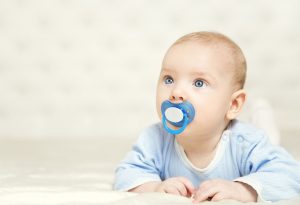In this Article
Adults get hiccups for multiple reasons such as eating too much or too fast, chewing gum, drinking soda, and so on. Hiccups are involuntary as they are linked to the autonomic nervous system which regulates heartbeat and other uncontrollable body activities. Just as it is normal for us, newborns experience hiccups often too. Not only is it natural for babies younger than a year old to get hiccups, but they often get hiccups even before birth. Therefore, as a new parent, it is important you know everything about how hiccups are caused, how to prevent and get relief from them, and when to visit a doctor.
Video: Baby Hiccups Causes Prevention Remedies
Is it Normal for Babies to Get Hiccups?
Newborn hiccups are caused by reflexive spasms of the diaphragm muscle which makes up the base of the rib cage and helps in breathing. They usually continue for about a minute to a couple of hours but are completely harmless as well as painless. When your baby’s organ systems grow to maturity, hiccups will naturally reduce. Funnily enough, your baby will find their hiccups as a source of joy or amusement at the sounds coming from their body. Take a cue from your little one and relax as hiccups aren’t problematic for a baby in most cases. There are multiple reasons for babies to get hiccups. Let us look at some of them.
Why do Babies get Hiccups?
While hiccups are not a cause for concern most of the time, occasionally they might be caused due to some underlying conditions your baby might have. Hiccups have multiple triggers that can set them off. In the womb, hiccups appear when the foetus swallows too much amniotic fluid, but after birth, it is most likely caused by one of the following:
- Feeding too much: if your baby has too much food, breast milk or otherwise, it will experience abdominal bloating. This swelling will force the diaphragm inside the abdominal cavity to expand, forcing it into sudden contractions. These contractions manifest themselves as hiccups.
- Breathing too much air at once: babies that drink milk from bottles are likely to have hiccups as they swallow a lot of air along with the milk. The influx of excess air results in bloating and the diaphragm is forced to spasm, just like in overfeeding.
- Irritants in the atmosphere: as babies have a delicate windpipe, excess chemicals in the air like dust, pollutants, concentrated smells and vehicle exhausts can make them start coughing. If the coughing continues for too long, the pressure exerted on the diaphragm leads to contractions and, consequently, hiccups.
- Asthma: Asthma complications in your baby can also cause hiccups. This is because the bronchi in the lungs can swell up due to inflammation, reducing the influx of air into the lungs. This results in wheezing, causing diaphragm spasms, and thereby hiccups.
- Allergic reactions: an allergic reaction involving the food pipe could cause it to inflame or swell up. The diaphragm reacts to this but contracts rapidly, causing hiccups. The baby might be allergic to milk proteins, as the allergy might be caused at any point if the mother changes her diet, altering the chemical balance of her breast milk.
- Changes in temperature: occasionally, changes in temperature in the stomach region of the baby’s body can cause the diaphragm muscles to spasm. For example, feeding the baby cold milk followed immediately by hot baby food is known to trigger hiccups.
- Gastroesophageal reflux: sometimes, the baby can have a condition where the stomach contents move back into the food pipe. This is known as gastroesophageal reflux. It is usually observed in babies who have a problem with the sphincter muscle separating the stomach from the oesophagus. This reverse flow of food irritates the oesophageal nerve endings, stimulating the diaphragm to contract rapidly, causing hiccups. While hiccups themselves do not indicate Gastroesophageal reflux, consistent hiccups along with other symptoms such as crying, crankiness and excessive spitting up is a reason to visit the doctor.
How to Stop Baby Hiccups?
Baby hiccups can happen often and last for over ten minutes at a time. However, if you feel distressed or think it is bothering your baby, here are some methods to stop your baby from hiccupping.
1. Allow the Hiccups to Stop Naturally
almost always, your baby’s hiccups will subside by themselves, usually when their triggers are gone. If the hiccups don’t seem to be stressing out your baby, you should just let them be and they will gradually stop on their own. However, do inform your doctor if they continue for hours or days.
2. Use Gripe Water
you could give your baby some gripe water if you feel that they are not comfortable. Gripe water is a blend of herbs like fennel, lemon and ginger that is thought to ease gastrointestinal afflictions. Dilute it before giving it to your baby, as it could be too strongly flavoured. Make sure to check the ingredients of the brand you use to ensure the contents are safe.

3. Use Pacifier for your Baby
when your baby begins to hiccup, you can give them a pacifier to suck on which will cause the diaphragm to relax and stop spasming excessively.
4. Sugar your Baby Up
feeding sugar is one of the oldest cures for hiccups. If your baby can handle solid food, place some sugar in their mouth. For babies who only consume fluids, their pacifier can be dipped in some sugar syrup. Sugar can relax the muscles of the diaphragm, calming it down and making the hiccups stop.
5. Use a Distraction
if your baby has consistent hiccups, try making them focus on something fun like an activity or a toy. As hiccups are naturally a result of muscular contractions linked to the nervous system, using sensory distractions like showing them something exciting like a toy or a cartoon could stop the hiccups.
Prevention
As baby hiccups have a variety of triggers, it is quite tricky to avoid them altogether. However, there are a few things you can do to greatly reduce the chances of hiccups.
- Position the Baby Upright during Feeding: always feed your baby in an upright position and make sure you keep them in that position for at least 20-30 minutes afterwards. This forces the diaphragm muscle into its natural position, making it less susceptible to spasms or contractions. Gently rub your baby’s back to promote burping as this could ease out any air swallowed during the feeding. This additionally helps the diaphragm move into a relaxed state, consequently avoiding hiccups.
- Breastfeed: breastfeeding your baby will prevent excess air entering their windpipes when compared to bottle-feeding. However, breastfed babies must be securely latched to the nipple to avoid air from entering. A tight latch also reduces the chances of developing nipple pain.
- Back Massage: regularly massage your baby’s back while in an upright position. This will ease the tension on his diaphragm muscles, calming it down. Gently knead their lower back in a slow circular movement until you reach their neck. Make sure you do not use too much pressure.

- Burp your Baby: this is one of the best methods of preventing your baby’s hiccups. In between feedings, make sure you burp your baby to get rid of all the air accumulating in its belly. It is recommended to burp your baby in an upright position after every few mouthfuls swallowed. Only pat or rub your baby on the back, never use force in this area.
- Feeding a Relaxed Baby: please don’t feed your baby only when they begin crying for food, as this could lead to excessive ingestion of air when the baby gulps his dinner down.
- Leave the Fun Activities for Later: do not indulge in activities that require physical exertion with your baby, such as bouncing him around and so on.
- Avoid Overfeeding: as overfeeding is one of the main culprits when it comes to baby hiccups, try not to feed your baby too much in one go. If required, feed your baby smaller meals but at frequent intervals. Burp them at least 2-3 times during each meal to prevent air from accumulating in their belly, especially if you hear the slurping sound which means they are swallowing a lot of air with their food.
Things you should avoid Doing
We have a lot of cures and remedies for when we get hiccups. However, these are not methods you should ever attempt on your baby as it could have serious complications.
- No Sour Candy: while sucking on some delicious sour candies helps us with our hiccups, they do not help babies at all. In addition, the sourness in these confections comes from acidic substances which are detrimental to your baby’s teeth.
- No Smacking your Baby’s Back: another technique that works on adults, but should never be tried on a baby. Babies have very delicate skeletal structure, and using pressure or force on it could result in severe injury. However, gently patting his back might help.
- No Pulling on his Tongue, Arm or Leg: an old wives’ tale, this is also very dangerous for babies as their ligaments and tendons are not yet ready to take on so much force.
- No Scaring the Hiccups Away: loud unexpected sounds help adults come out of their hiccups by giving them a startling distraction, but they might terrify your baby or even injure their delicate eardrums.
- No Putting Pressure on the Eyes: please do not press on your baby’s eyeballs as the muscles that hold them together and help in their movement are not yet fully functional. Doing this might lead to the eye taking on a squinted position.
- No Holding your Baby’s Breath: this one is self-explanatory. Lack of oxygen is extremely dangerous for your baby and this method should never be employed for any reason.
When Should You Call the Doctor?
You know by now that hiccups are perfectly ordinary occurrences in your newborn. However, there are some cases where you might want to refer to a doctor for medical advice.
- If your baby hiccups constantly, produces a lot of spit, is very cranky, and cries after feeding, please contact your doctor immediately. These symptoms could be a sign of Gastroesophageal reflux, which is a severe condition that requires medication and/or surgery.
- If your baby hiccups for a long time, i.e. several hours to a few days, this is an abnormal situation and it is advisable to consult your doctor. Normally, babies can hiccup for up to an hour, but if it extends for much longer it could be a sign of something serious, especially if your baby is coughing and wheezing at the same time.
- If your baby’s hiccups are disturbing their scheduled activities such as playing, feeding and sleeping, it is recommended you take them to a paediatrician. Continuous hiccups will also cause a great deal of agitation for your baby and must be dealt with as soon as possible.
It is understandable to be nervous at unexpected things your baby does. However, hiccups are not one of them. Remaining patient and calm is first and foremost for both your peace of mind and your baby’s health. Hiccups are completely natural and harmless. Ensure you follow certain precautionary measures to avoid and cure hiccups when they emerge in your baby. If the hiccups become chronic or appear alongside other symptoms, please contact your doctor.









